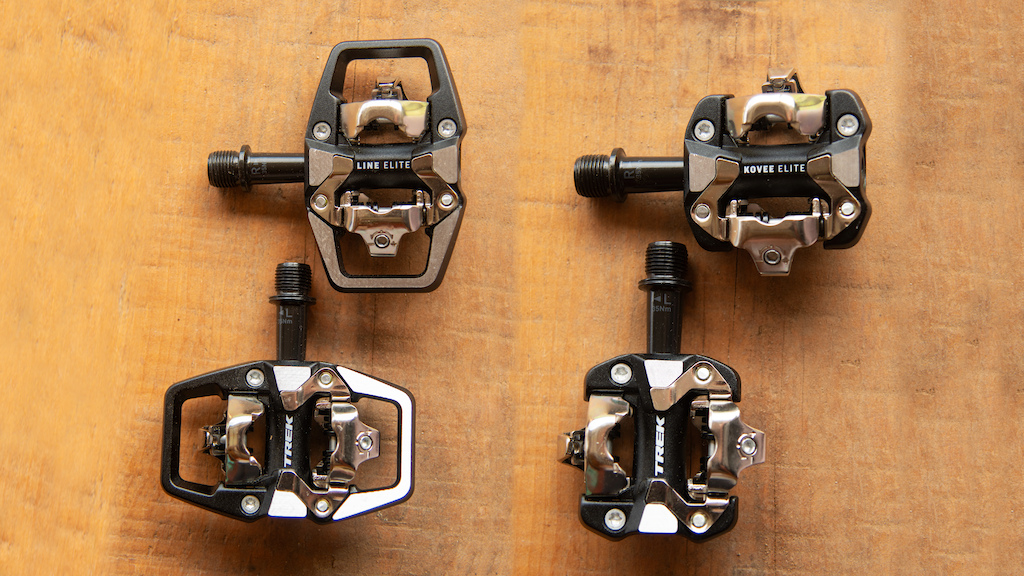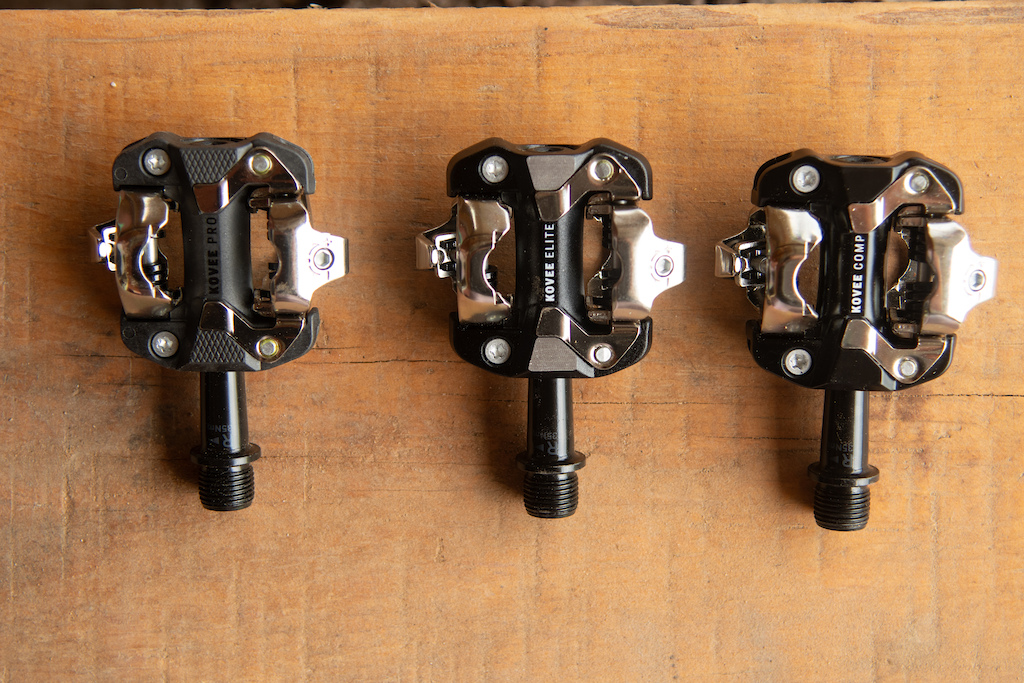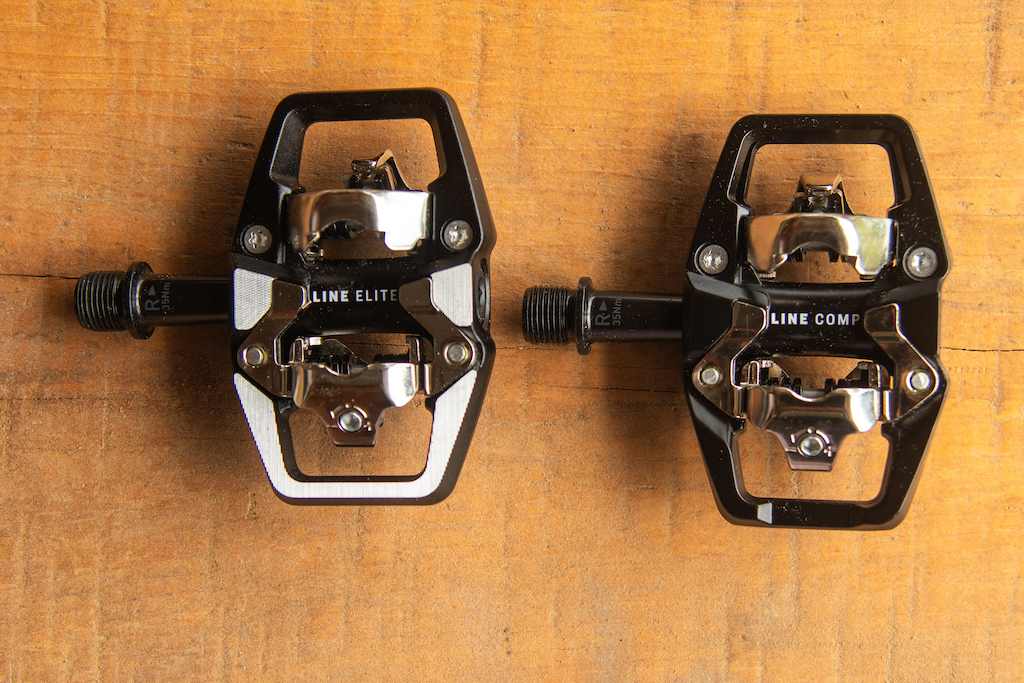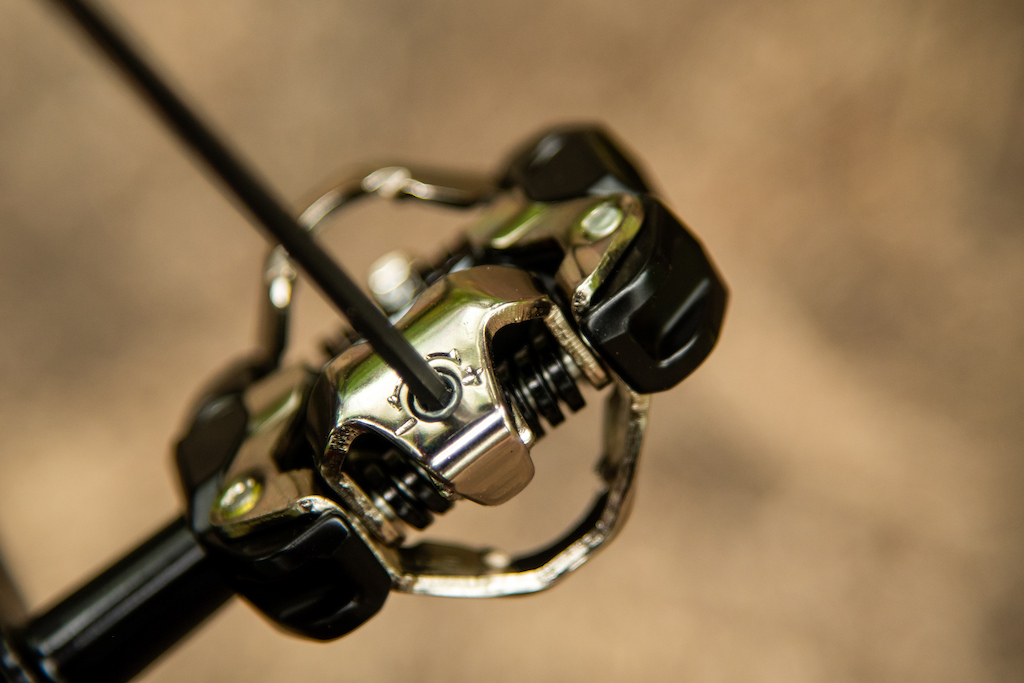Trek Releases 5 New Clipless Pedals
Trek may not be the first company that comes to mind when considering clipless pedals, but they've recently expanded their lineup, increasing the number of options from one to five. The pedals are SPD-compatible, and they run the gamut from a 336 gram XC-oriented model with a composite body to a trail-style pedal with a mid-size aluminum platform around the clip-in mechanism.
All of the pedals have 7-degrees of float, plus adjustable spring tension. The XC options receive the Kovee model name, and the larger-platformed trail pedals are under the Line model name. All of the pedals spin on sealed bearings and chromoly spindles.
My initial impressions are that the weights and prices are all in the reasonable realm, and my first few rides on the Line Elite pedals have been free of any surprises. The entry and exit is smooth, and I was able to find my ideal tension level without any fuss. I'll see how they hold up to a few months of sloppy conditions and report back.
Kovee Pro
Composite body
336 grams
$150 USD
Composite body
336 grams
$150 USD
Kovee Elite
Forged body with anodized plates
390 grams
$110 USD
Forged body with anodized plates
390 grams
$110 USD
Kovee Comp
Diecast body
383 grams
$65 USD
Diecast body
383 grams
$65 USD
Line Elite
Forged body
450 grams
$110 USD
Forged body
450 grams
$110 USD
Line Comp
Diecast body
430 grams
$75 USD
Diecast body
430 grams
$75 USD
More info: trekbikes.com
Author Info:
Must Read This Week





Edit: should have said I dont get that "ice skating" feeling like I used to with the XTs when moving my foot through the float.
all you need to look at is why shimano DH racers use CB mallet DH...
It's been heavily talked about before that Big platform Clip pedals are better than relying on an XC style pedal.
It also gives a much better feel if you cant get clipped in, I was like you lad untill i spent so much money on SPD and CB pedals 100% the pedal support is needed. a stiff shoe is also not the answer, tried that, just end up with sore feet and legs.
Racers use them because blowing a foot when going 110% through the biggest, baddest, literal "world-class", technical chop can cost them part of a paycheck. But they also have great technique already, they're not relying on the clip, it's just backup, extra security.
And if you need it tight so you don't blow off or to feel more connected, that's relying on it, because both of those things can be done with technique.
I didn't say anything about being stuck in.
Yes, I already mentioned racers wanting the backup because of paychecks.
As in…..if I bought a bike (that I wanted clip in pedals on) that came with these pedals, I’d keep them. But if I bought a Trek without pedals, I’d buy Shimano all day.
That said, Bontrager plastic flats are one of the few options that rival the mythical performance of Deftraps. Farley came with a pair-and they’re still on there three years later.
All the bikes with clip ins I have (road, track, gravel) are on Shimano pedals because their bearings are the best and they clip in and out the most smoothly and consistently.
Then again, on my trail bike it’s Deftraps for life…..or until someone makes a better flat pedal.
I know that's very wishful thinking, and more than likely it would just lead to brands being watered down for the masses, but a man can dream.
They sell repackaged Swissstop pads and SRAM Udh's for 50% mark up.
(Full disclosure-I worked for Trek and despise them-bikes are ok though)
50% of a bike? Many bike brands have house-brand parts for almost everything except drivetrain and suspension, even small to medium ones.
Now, they’re just a design and marketing firm but they’re trying to offer every product with a house brand logo on it. I guess it works for Specialized (although Specialized is 49% owned by Merida, which makes all of their bikes, which muddies those waters).
I think Trek’s current offerings across the board are really good, and the aluminum framed “8” options are awesome, from the Emonda to the Slash.
But…….kind of a bummer they outsourced an entire factory and supply chain.
I’m more mad that they chose to slowly shutter all of their manufacturing in Wisconsin and become a design house instead of a bicycle manufacturer. They had the scale and internal expertise to keep at least some of those jobs in the US.
Also used those stupid rear facing dropouts.
Trek was paying to develop two complete lines of full suspension bikes with unique geometries, suspension designs and shock tunes. That was redundant, so they killed the Fisher brand.
Companies like Trek and Specialized are just design firms at this point.
Their modus operandi is generally to buy the company as an investment and let them do their thing pretty much independently.
Not saying PON is a great company or anything, but more that whether or not Santa Cruz does cool stuff isn't much influenced by the ownership.
Fun fact:PON got big by importing cars, but they started out as an LBS.
Trek isn’t offering a unique product, they’re just badge engineering off the shelf stuff. The Trek logo means a markup, nothing more.
Knockoff SPDs aren’t bad. For a rider on a tight budget, nothing wrong with grabbing some VP or Wellgo pedals. But with the Trek logo (and markup) might as well go for real deal Shimano stuff.
Of course Trek is just rebranding stuff. All these house brands are like that, some carry the name of the bike brand, others make up some other name. Do people actually expect otherwise?
If you can’t offer something better, don’t bother. False choice isn’t a choice.
Sram has more or less taken a dominant position across components - frankly, they managed to move through not only their AXS offering, but all the way into T-Type "transmission" and e-bike system, while also building really good suspension, wheel offerings, etc. If they came out with brakes that rivaled TRP, Trickstuff and Hope in terms of both modulation and power, you could truly build a "top shelf" bike with all Sram. All of this was done with almost zero response from their competitor in Shimano. This lack of market pressure in the component stack has to be worrying to bike OEMs. Short of a SRAM frame, they are starting to own the market.
Meanwhile, the bike OEMs have started to become defined as "only" the frames on which all the other components are hung, and their own brand recognition. This is why we'll see major efforts to continue to develop components that will be interesting and provide them a defensible market position in the future (e.g. better e-drive systems, other components, etc.) so that they don't become valued only based on their branding and marketing abilities. I expect to also see a major move toward connectivity, applications, "digital relationship" with the end customer, and ownership of the distribution channels (shops, etc.).
Nothing against Trek really but they have a tendency to pull that heavy capitalistic approach a bit too often.
The composite pedal body on the pro model is different at least. It’s a bit difficult to innovate when we honestly don’t seem to like innovation.
For the record, I like innovation too. I use the term “we” because the purchasing decisions of the masses are always going to dictate what gets produced, whether I like it or not. I welcome your choice to buy Hope pedals. It’s nice to support the smaller guys. I’ll probably keep the SPDs, personally, even if that is the “heavily capitalistic approach”.
XT pedals only weigh a little more, run forever if you regrease them (a 5-10 minute job) every year.